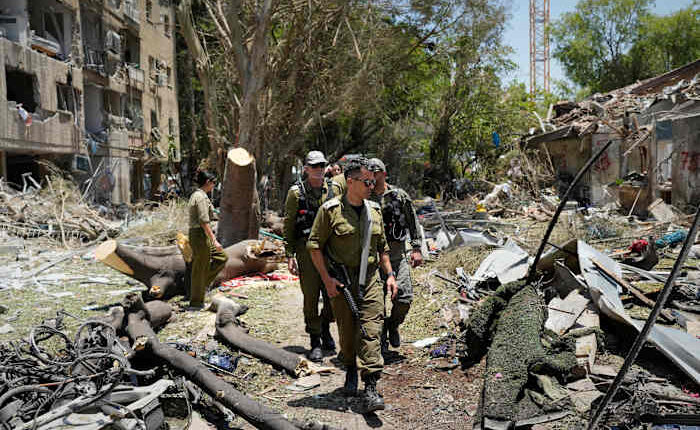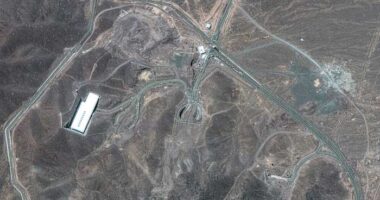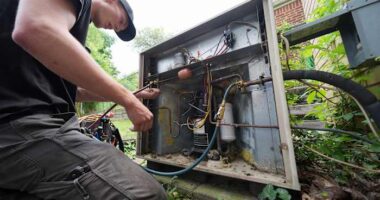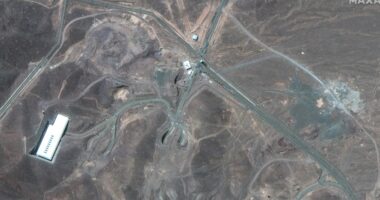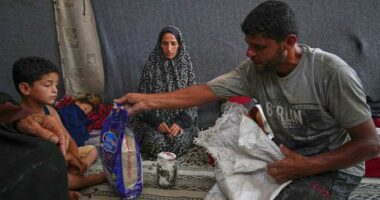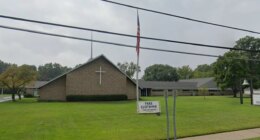
TEL AVIV – Shortly after the U.S. targeted three Iranian nuclear facilities, Iran launched over 40 missiles towards Israel on Sunday. This act resulted in 23 individuals being injured and caused extensive destruction to apartment buildings and houses across three cities.
In Tel Aviv, one of the impact sites witnessed a powerful explosion that severely damaged a high-rise residential building and caused harm to several other structures, including a nursing home within a radius of hundreds of meters. Fortunately, the number of casualties was limited as a considerable number of residents had already been evacuated, while others sought refuge in bomb shelters.
Deputy Mayor Haim Goren, present at the scene, described it as a “miracle” that the injuries were not more severe. In a collaborative effort, relatives and healthcare workers assisted residents, many of whom used wheelchairs or walkers, in vacating the nursing home. The building’s windows were shattered up to the 11th floor due to the force of the blast.
“It’s like a typhoon came through my apartment,” said Ofer Berger, who lives near the impact site on the seventh floor of a high-rise. “All of the apartments in this area are destroyed,” he said.
Emergency services said one person was moderately wounded by shrapnel in Sunday’s missile barrage while dozens of others were lightly injured.
Berger said he hoped the war with Iran would end soon. “Most of the tit-for-tat strikes like this end with a lot of tears,” he said.
Residents sat with their pets and suitcases outside the damaged buildings. One person sat next to a shopping cart filled with Buddha statues and a child’s bicycle.
Families gathered what they could and stepped gingerly around piles of glass and twisted metal. Dozens of volunteers from an organization called “One Heart” showed up to help residents salvage their belongings.
Strikes have displaced more than 9,000 people from their homes since the start of the war, according to the Israeli military. Missiles have damaged 240 residential buildings, including more than 2,000 individual apartments.
Mira Goshen, 79, said her entire apartment was destroyed.
“My mamad was shaking like a leaf, and I thought it was the end of the world,” Goshen said, referring to the reinforced safe rooms that are required in all new construction. She said the shelter had saved her life. In some areas where entire homes were flattened, the reinforced rooms stood intact.
Goshen’s pet bird, Chica, survived an 11-story drop when her cage was knocked off the balcony by the explosion. A rescuer retrieved her, and she was trembling and burrowing into Goshen’s neck hours later as Goshen spoke with neighbors and authorities outside her building.
Hours later, municipality workers worked to sweep up the the shattered glass and remove debris, while others handed out sandwiches and water at an aid station.
Several businesses on a nearby street had their windows blown out, and the stores were littered with broken glass amid baked goods, children’s clothes and books. Workers at a supermarket stacked crates of fruit in front of a shattered front window and opened for shoppers, who packed the aisles.
Residents appeared calm in the aftermath of Sunday’s strike, but Goren said the nightly barrages, the frantic running to shelters and the close confines inside them are taking a toll.
“There’s a lot of stress and pressure building, lots of nerves,” the deputy mayor said. Mutual aid groups are working around the clock to match families in need with shelters and support, and the municipality is working to convert parking garages, bus stations and train stations to temporary shelters.
Goshen said she was more focused on where she would go next than on the U.S. strikes on Iran and their aftermath.
“I’m far away from politics, and what I think, it doesn’t matter actually, because they don’t listen to ordinary people,” she said.
Copyright 2025 The Associated Press. All rights reserved. This material may not be published, broadcast, rewritten or redistributed without permission.
